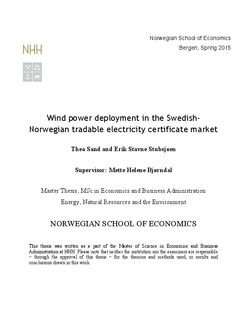Wind power deployment in the Swedish-Norwegian tradable electricity certificate market
Master thesis
Permanent lenke
http://hdl.handle.net/11250/300143Utgivelsesdato
2015Metadata
Vis full innførselSamlinger
- Master Thesis [4372]
Sammendrag
This thesis examines the market-based common Swedish-Norwegian tradable electricity
certificate support scheme for investments in new electricity generating capacity from renewable
energy sources, with a particular focus on deployment of wind power in Norway. We evaluate
the costs of onshore wind power projects in the pipeline and their potential to contribute to the
quantitative target of adding new renewable electricity generation corresponding to 26.4 TWh
per year by 2020. We present relevant theory on electricity certificate markets and available data
on the Swedish-Norwegian electricity certificate market. We show how several features of the
policy design are likely to result in high risk and uncertainty to potential investors. In particular,
there is a risk of overshooting the quantitative target, resulting in certificate price spoilage, due to
a lack of information regarding the supply and demand for electricity certificates over the
duration of the scheme. The large electricity generation potential of the projects in the pipeline
reinforces the risk of overinvestment. Risk and uncertainty is likely to contribute to high riskpremiums
and increase the capital costs of new investment. These costs, which ultimately are
covered by the electricity consumers in Norway and Sweden, have the potential to weaken the
cost-effectiveness of the policy. Improved systems for information in the market, increased
transparency in electricity certificate trade and more frequent corrections of demand deviation
are suggested as viable measures that the regulators can take in order to reduce risk and
uncertainty faced by the market participants.
